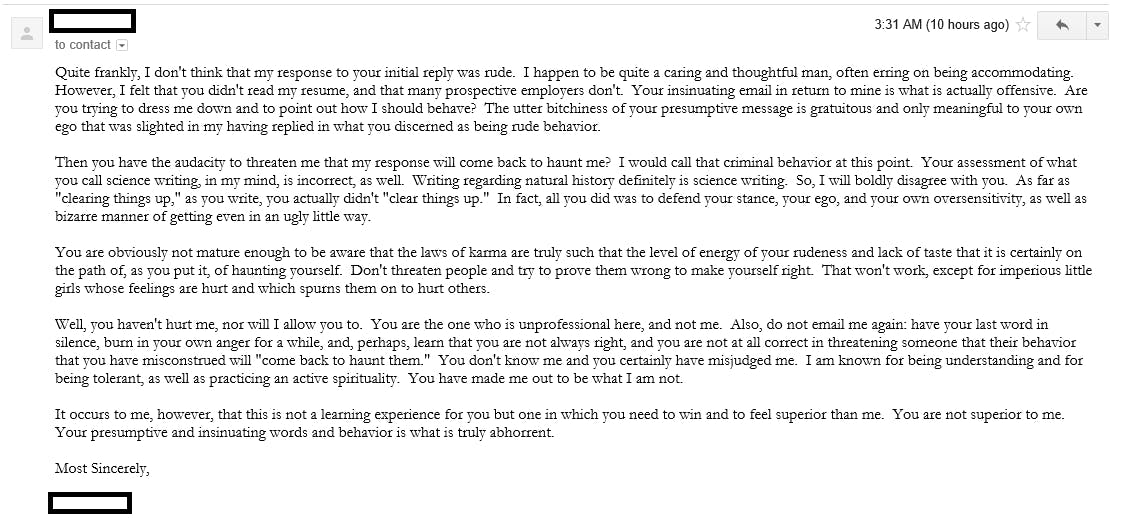BY JOLENE CREIGHTON
I run a science site, From Quarks to Quasars. Like most science sites, we post articles about the latest developments in science news and research. Recently, we put out an ad on Indeed.com looking for part-time, freelance science writers. We received some 100 responses (and counting). A lot of the people who applied had a ton of experience in a variety of fields; however, no real experience in science writing.
We also got quite a few applications from people who have rather impressive science writing credentials. As such, we had to reject a lot of people with pretty outstanding resumes. Although many had a lot of experience, and were very articulate and impressive candidates on the whole, they didn’t have relevant experience.
And of course, there was one older, white, academic man who felt the need to tell us that we are “imperious little girls” and that we are “not superior to [him].”
Perhaps another key to this equation, one that I have failed to mention hereto, is that From Quarks to Quasars is managed by two women. Perhaps that is irrelevant, but I don’t think so. The “little girls” reference makes that pretty clear.
But either way, the exchange that I had with this individual reeked of that patriarchal arrogance that one sometimes finds in gentlemen who are in positions of power. You know the ones that I mean—the men who have been groomed by our society to feel that they are “special,” that they are an authority on every subject, that their point of view is the only right one, and that (in short) they are the masters and kings of all that they survey. Such people often assume a tone that is patronizingly paternalistic, which you will see in the way that this individual scolds us.
But to get to the story…
The person in question is an academic. He is an American poet who has a list of publications that is about a mile long. Several poetry books, chapbooks, reviews of poetry books, essays on poetry that were published in peer review journals, and on and on. Consequently, if you look up his resume online, as is true of many academics, it is absurdly long (listing about 100 publications). Clearly, he is successful in his line of work. However, his “line of work” is clearly not science writing. The introduction to his cover letter reads thus: “I am a well-published and award-winning poet; a free-lance journalist; a writer of non-fiction and a stylist in the lineage as Joan Didion and John McPhee; and a children’s book author.”
So. Not science.
Why we rejected him
Simply put, he’s not a science writer. That’s the only consideration that factored into our decision. Looking at his impressive list of publications, there isn’t anything even remotely on science. At least, nothing that I have seen. Admittedly, I didn’t look up every single publication. But either way, if not being a science writer isn’t a good enough reason for you, here are a few other reasons that we could have rejected him.
- He didn’t send a resume (which our job ad listed as “required material” for any potential candidate). We had to look it up online ourselves; he didn’t even include a link to it.
- He didn’t send a 500-word writing sample on a relevant news story (again, our job ad listed this as “required material” for any potential candidate). When you are looking for science writers, and you want to effectively assess them, having a writing sample is an absolute must.
- He sent a generic cover letter that was not geared towards our organization or our job ad. We received hundreds of submissions. If we are going to take the time to read the documents that you send us, you should take the time to tailor the documents to us.
How he responded and where we went from there
Apparently, one time, this person wrote an article about an artist who did paintings of dinosaurs. Writing an article about someone who did dinosaur paintings makes him a science writer. The fact that we didn’t notice this one article (out of his absurdly long list of publications) means that we didn’t bother to read his cover letter, have no discernment, and think that we “know it all.”
You have to carefully think about what you say when you post something online. You’re never speaking into a vacuum.
I shouldn’t have responded to his (highly unprofessional) email. However, I am a doctoral candidate at the University of Southern Mississippi. My focus is on English Literature, meaning that I know a lot of poets. A whole lot. I could have forwarded this email to all of them. I could have posted it on professional forums. I could send it to journals where he has been published. I didn’t, because I am not that cruel (or insane), and it would really serve no purpose.
But I did respond to the email, stating that his reply was unprofessional and reminding him that it is a bad idea to go on the record using such rhetoric. Anyone who knows anything about the viral natural of the Internet knows that it is a bad idea to go on the record about anything. I also explained that we did read his cover letter but, no, writing about a painter (even if the painter paints dinosaurs) is not science writing.
I didn’t mention that we move in the same circle. I didn’t say that I had no intent to actually pass the email on. I didn’t expound or clarify because, quite frankly, it wasn’t worth my time. Really, I just wanted him to rethink his rhetoric. I was genuinely trying to give him some feedback on his approach. People are always so mean to strangers on the internet, but (as many of my other posts state) we don’t have to be mean to strangers on the Internet. Writing to us the way he did is entirely unacceptable.
Anyways, clearly, he didn’t spend any time reflecting on his rhetoric or how he was presenting himself. Why would he? He is a highly educated academic. We are just “little girls.” Clearly, he is in the right and we have no idea what we are doing.
Why I am posting this
I am posting this for several reasons. I want people to know that, when you write to a stranger on the Internet, you aren’t just writing to a stranger on the Internet. This is something that I try very hard to teach my own students. If the person chooses to share your words, you are (for all intents and purposes) writing to whoever they show your words to. Thus, you are (potentially) writing to the whole world. Consequently, you have to carefully think about what you say when you post something online. Indeed, you should reflect on your rhetoric whenever you write anything anywhere. You’re never speaking into a vacuum.
I am posting this because I want people to know that there is a real person sitting on the other side of the screen. You wouldn’t walk up to someone on the street and call them an “imperious little girl.” Don’t do it online. The internet can be a fantastic community. It doesn’t have to be a place where we all go to be mean to one another. It shouldn’t be a horrid free-for-all. Using the words that he did is a horrible way to present oneself to potential employers…or anyone. Even on the Internet, only jerks are mean.
You wouldn’t walk up to someone on the street and call them an “imperious little girl.” Don’t do it online.
I am posting this because I want people to see how women are treated online. The number of times that I have received gender based insults from people on the internet is horrifying. Receiving even one is horrifying. But it’s not just the gender based insults, because the sexism would be there even without the insults. It’s in the tone that he adopts—the arrogant, authoritative, “king of all he surveys” attitude. And I don’t think that we can separate this individual’s response from his gender. While, in my own experiences with my peers, I feel accepted and respected, I still feel that this is an issue that needs some addressing and should be acknowledged.
But I will leave everyone to make their own decisions, as the exchange is posted below (with his name removed).
Note: What does this really show? It is just one email from one man?
This keeps coming up, so I thought that I would try to clarify.
Most men do not respond like this. However, in my years as a science writer, we have gotten hundreds of nasty emails and thousands of nasty comments. Overwhelmingly, sadly, they come from men. In fact, I can’t remember one hateful email from a woman (Seriously.)
For example, I wrote an article about vaping (having no idea that so many were so invested in the debate—my bad). We got a lot of nasty comments from both genders, but only men took the time to look up my email address, research my work history, track down all my social media accounts, and send me hateful responses from all avenues. And this is not the first time this has happened. I wrote an article about a peer review study on games (it stated that video games do not cause violence), and it was the same thing. When I try to talk about sexism in video games on my own Facebook wall, my god, it was a horror show. And it was all men. Every single one.
And I’m not even saying that they necessarily did this because I am a woman. I think they did it because of their gender and how they were raised to perform masculinity.
It’s not all men; it’s not even most. But there seems to be an issue, and I think it warrants a discussion. For the most part, people who read this (and responded) seemed to understand this. And the discussion has been great.
For those who didn’t understand, or for those who don’t agree, hopefully this makes my thought process clearer, even if we still don’t agree.
Thanks for reading.
This article was originally featured on Medium and reposted with permission.






